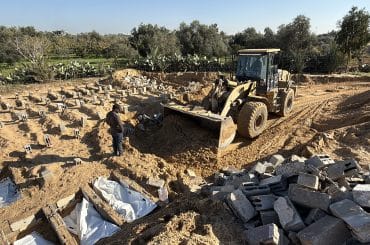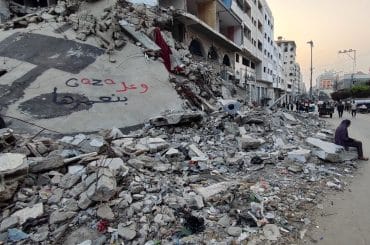
Ben Ehrenreich’s March 15 cover story
On March 15, The New York Times Magazine broke important ground in the mainstream by publishing Ben Ehrenreich’s long and often-thrilling account of resistance in occupied Nabi Saleh, based on his visits to the Palestinian village last summer and earlier this year. The cover of the magazine featured heroic portraits of villagers who had guided the village’s political movement at huge risk, and Ehrenreich’s article portrayed young Palestinians’ throwing of stones as a valid response to military occupation. “The stones were … symbols of defiance, of a refusal to submit to occupation, regardless of the odds. The army’s weapons bore messages of their own: of economic and technological power, of international support.”
While the Forward and Haaretz were quick to attack Ehrenreich for his failure to believe in Zionism–seemingly out of fear that the piece would get a lot of attention– there has been surprisingly little media followup to his important article.
So last week I called the anti-Zionist Jewish novelist, 40, at his home in California to ask a few questions. The record below includes some follow-up by email.
Q. What’s the response been to your piece?
Ben Ehrenrich: Predictably it has been mixed. The most immediate reaction came, not all that surprisingly, from liberal Zionist quarters, from Chemi Shalev in Haaretz, who wrote something of a self-fulfilling prophesy, predicting that the piece’s critics would focus their attacks on me. All of Shalev’s substantive points were written in the subjunctive, such as his suggestion that the piece “might” be read as encouraging an intifada and would “likely” elicit condemnation. He pointed readers to an op-ed I published in the L.A. Times in 2009 [“Zionism is the problem”] in which I argued that a principled opposition to Zionism had been a mainstream stance within Judaism for most of the twentieth century and in which I made the case for an ethical, Jewish critique of Zionism.
Everything that followed both from both liberals and from points much farther to the right followed Shalev’s lead. No criticism that I saw made any serious effort to take on the piece on a factual basis. Factually it was ironclad—it was extremely closely fact-checked. So no one attempted to engage with the piece directly, which is a shame.
It was the usual attempt to limit the discourse by delegitimizing any possible criticism and demonizing any possible critics. The approach was, “This guy’s an anti-Zionist and he shouldn’t be allowed to talk about the issue at all.” Which is absurd really. Ali Gharib made the point in the Daily Beast that if only Zionists are allowed to talk about Palestine, 99 percent of Palestinians would be disqualified from analyzing their own predicament. Another popular line went, “There are a lot of interesting facts in this article, but it’s all out of context,” and it quickly became clear that the only context they would have accepted as relevant was one that would refute all the facts, namely that the people I wrote about are really violent terrorists and everything they say is a lie.
I didn’t think it necessary or productive to respond to any of the criticism. Some people seemed to want me—or my editors—to recant what I had written in the L.A. Times op-ed, as if it were something I should be ashamed of, but I stand by everything I said in that article, and I think it’s worse than ridiculous to demand absolute allegiance to Israel as a precondition for being able to comment on the actions of the Israeli state. One of my goals in writing about these issues has been to broaden what has for years been an extremely and dangerously narrow discourse, to try to expand the borders of what can be said. Some people clearly find that threatening.
Q. There wasn’t a lot of pickup of your story by journalists seeking to interview you.
No. I went on one radio show out of Chicago. Other places I might have expected to follow it chose not to go after it.
Q. Are you telling me that the only interview you did was with that Chicago radio station?
The only interview I did was that one radio station.
Q. Why do you think that is?
I don’t know. There’s obviously been a great deal of hesitation among editors and producers to grapple with this issue at all. They did have a news hook: Obama was in the West Bank.
Q. Did this surprise you?
Not terribly.
Q. But Amira Hass is over here on her duty-to-throw-stones story, and Nancy Updike did a story on Nabi Saleh for “This American Life.” Aren’t we in a new moment for the American discussion about Palestinian resistance?
I certainly feel that it’s possible to say things in the American press that it wasn’t possible to say a few years ago. I think the tipping point was Cast Lead. After the bombardment of Gaza in 2008 and 2009 a lot of Americans found they could no longer offer Israel the kind of uncritical support they had given it for so long. The logic of self-defense became harder and harder to justify. I wrote that L.A. Times op-ed in the wake of Cast Lead and was shocked when the paper agreed to publish it. I was quite happily surprised when the New York Times decided to assign the Nabi Saleh piece. It’s extraordinary that they chose to publish this piece. They showed a lot of courage in doing it.
And I was very happy to have my inbox overwhelmed by supportive emails after the piece ran. I received a couple of dozen emails attacking me, which I expected, but also dozens and dozens and dozens of emails thanking me for writing the article, expressing happiness and surprise that it was published in such a prominent place as the Times Magazine. I had a similar experience with that op-ed in 2009. People wrote me with this incredible sense of relief, that I had been permitted to express ideas in print that many people share but that they never see reflected in the mainstream press. At least in terms of popular opinion and media discourse, something is certainly shifting in the U.S. Unfortunately that shift isn’t reflected in the actions of our politicians, which was quite clear from Obama’s trip.
Q. Your piece didn’t take a political position or offer much political analysis, one state, two state.
I think that it’s fairly easy to make a case in one direction or another and it happens on op-ed pages all the time. More in one direction than the other perhaps. But what you don’t see at all in the American media is Palestinians who are not P.A. officials or Hamas officials being taken seriously. You do not see them portrayed as human beings dealing with the humiliating realities of a military occupation and you do not see them as individuals making painful moral choices and committing themselves to a daily struggle with no end in sight. I don’t believe the piece romanticized anything, but I did make a great effort to provide sufficient historical and political context for readers to understand why and how the people of Nabi Saleh act as they do, to allow readers to understand their struggle on their terms, not on terms provided by the IDF or the State Department. Those are perspectives that we don’t get in the US media, and it seemed far more important to document them accurately than to make easy political points.
Q. It was rumored that the Times editors were surprised to learn of your 2009 LA Times piece at the time of your detention by the Israeli army in Nabi Saleh July 2012–when news broke that you were over there for the Times, and folks on twitter got very excited about the LA Times story.
I don’t think so. It took a lot of courage for The Times to publish it, and I felt very well backed throughout. They were very committed to this piece.
Q. The piece seemed to be delayed for months. I thought it was going to die. What happened?
There isn’t really a story there. They held it for various reasons that weren’t political. It was about to close when the Gaza war broke out in November, and, since no one knew what was going to happen, they decided to hold off. By December my original reporting, which I had done over the summer, was beginning to feel stale, and they made the decision to commit more resources to the story. They sent me back for another three weeks and sent Peter van Agtmael, the photographer, whose work is really extraordinary, back as well. They certainly knew they would catch heat for publishing the story, and they pushed ahead and ran it almost as soon as Peter and I returned from the West Bank.
Q. How did the piece originate?
I had visited Nabi Saleh briefly in 2011 while working on a piece for Harper’s about the role of water in the occupation of the West Bank. In early 2012, a Times magazine editor asked me to pitch stories. I came up with five or six ideas, including a piece on Nabi Saleh. (None of the others were Palestine-related.) To my surprise, the Nabi Saleh story was the one that caught the editors’ interest.



Wonderful interview Phil.
I loved this very last sentence:
It’s a great play on the tribal loyalty thing and ‘loyalty’ to the clash of civ. narrative.
And it also relates perfectly to the article about Max Ajl and his mom defending him in the comments section of the article in question.
‘Treason’ against injustice inbuilt or a product of tribalism is a worthwhile endeavor and a moral imperative.
It’s really not surprising that there has been almost no media followup to Ehrenreich’s piece – that is the typical response to any important piece of information that disturbingly contradicts the official line. Look at the near-silence that greeted the news that the 911 bombers were motivated in large part by US support of Israel.
It’s also not surprising that Ben Ehrenreich is the daughter of Barbara – two excellent journalists with a strong moral sense.
It is not surprising that there was next to no follow up. When it comes to the big players/owners in our print and broadcast media, opposition to Israel’s ethnic cleansing of the Palestinians is 0%. Can you think of even one exception?
Nice interview, Phil. Ehrenreich is very impressive.
That “brand of treason” is the first step to breaking free of identity politics.
Where Jews to no need to feel to reveal their identity when appealing for universal and humanistic values instead of Zionism, which is neither universal nor humanistic, but tribal.
That “brand of treason” that will allow Jews to be just like the rest of humanity first as a driver of motivations and not identity, real or imagined.